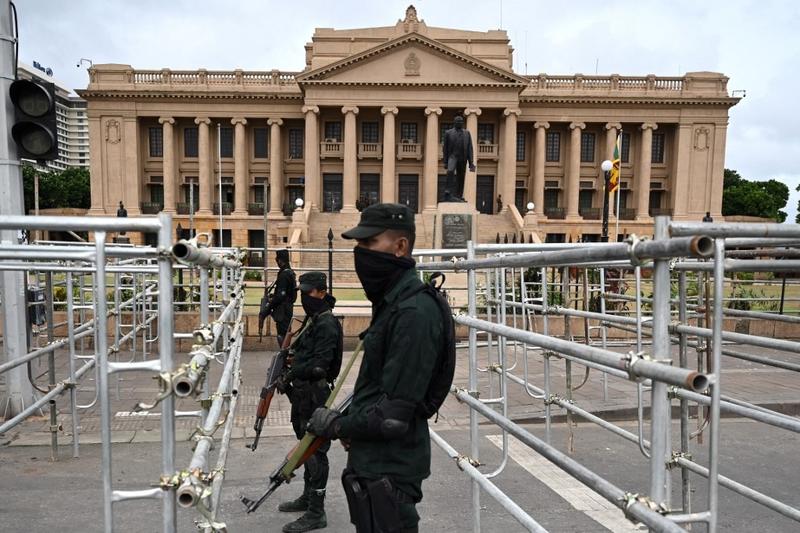 Members of security personnel stand guard in front of Presidential Secretariat in Colombo on July 24, 2022. (ARUN SANKAR / AFP)
Members of security personnel stand guard in front of Presidential Secretariat in Colombo on July 24, 2022. (ARUN SANKAR / AFP)
COLOMBO/SINGAPORE - Sri Lanka's parliament on Wednesday voted to approve the proclamation of the state of emergency earlier in July by then acting President Ranil Wickremesinghe, allowing its extension.
In the voting, 120 parliamentarians supported imposing emergency regulations and 63 voted against.
In the voting, 120 parliamentarians supported imposing emergency regulations and 63 voted against
The state of emergency was declared by Wickremesinghe with effect from July 18 under the Public Security Ordinance in the interests of public security, the protection of public order and the maintenance of supplies and services essential to the life of the community.
According to the legal provisions, if the approval of the parliament is not obtained within 14 days of the said proclamation, it shall expire.
READ MORE: Ex-president Rajapaksa expected to return to Sri Lanka
Wickremesinghe was elected to be the president of the South Asian country in a parliamentary vote on July 20 and was sworn in a day after.
Meanwhile, Singapore has permitted former Sri Lankan president Gotabaya Rajapaksa to stay in the island republic for an additional 14 days, two sources familiar with the matter told Reuters on Wednesday.
A short-term visit pass issued when Rajapaksa arrived on a private visit two weeks ago has been extended, two separate sources in Colombo and Singapore, both with knowledge of the matter, told Reuters.
Rajapaksa is now able to stay in Singapore until August 11.
ALSO READ: Economic crisis pushes Sri Lankans to seek overseas passports
The Immigration and Checkpoints Authority in Singapore did not respond to a request for confirmation on the extension of stay.
Rajapaksa landed in Singapore on July 14, a day after fleeing his crisis-ridden country via Maldives and following a popular uprising that forced him to resign as president.
At the time, the Singapore government said he had not been granted asylum, and was in the country on a private visit.
"It is my belief he may eventually consider returning to Sri Lanka but there is no definite political or other stance on this," Sri Lankan government spokesperson Bandula Gunwardena said on Tuesday.
The country of 22 million people has been crippled by a devastating economic crisis for several months, with shortages of fuel, food and other necessities as foreign exchange reserves needed for essential imports dropped to record lows.


